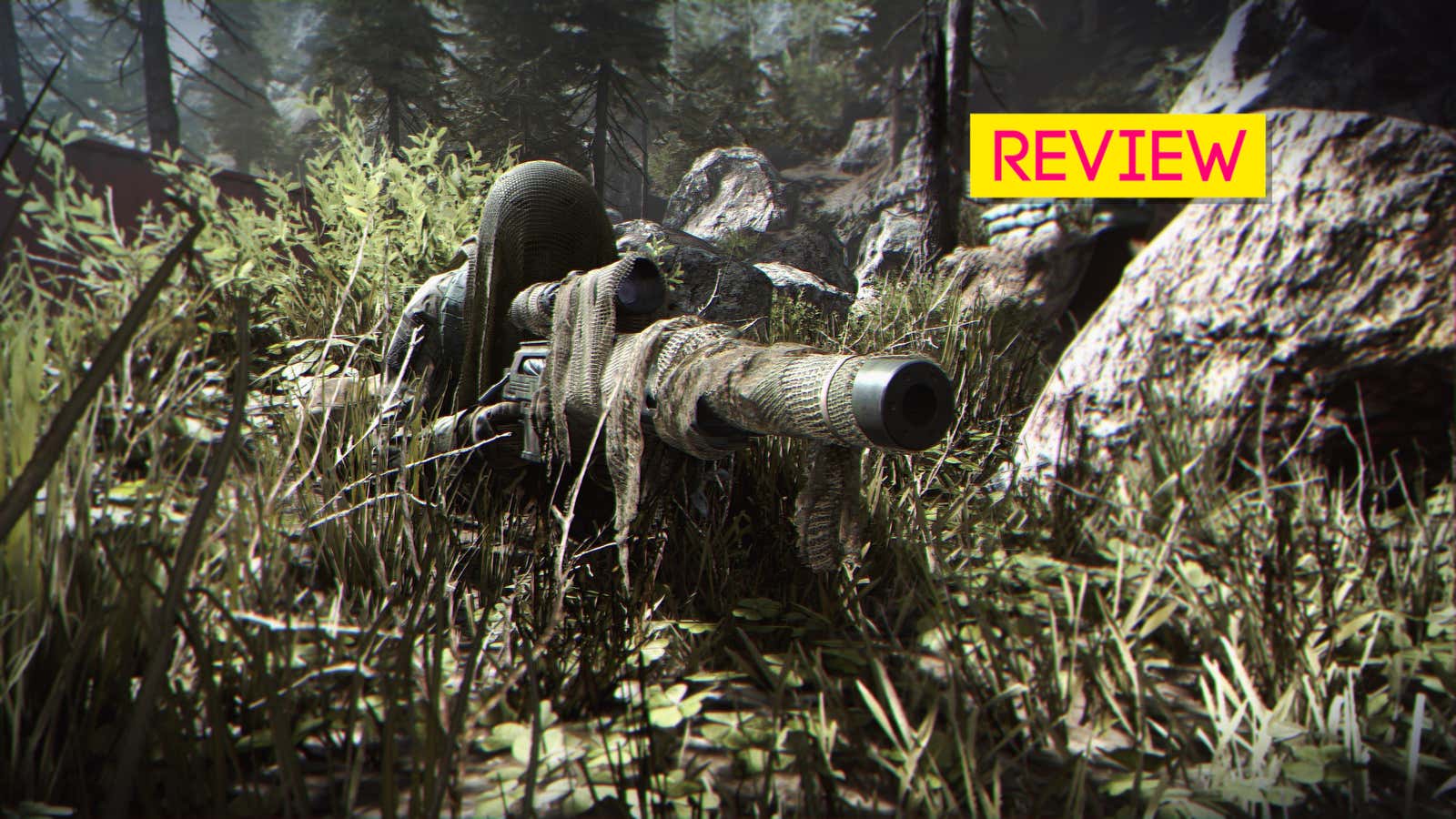Across thousands of years of existence, we as a people have come to regard war as pretty bad. Senseless violence and the loss of irreplaceable lives, usually in the service of petty men who wield the power of nations indiscriminately, is just fucking stupid. Yet it still happens, and in America, the necessity of the military is upheld even as the invaluable lives in its service are extinguished in barely-justifiable violence.
Perhaps you find that portrayal of global conflict glib, or disrespectful. You would be 1) correct, and 2) pretty well-equipped to understand the level of nuance in Call of Duty: Modern Warfare, this year’s installment in a long-running series of military shooters, available now on PC, PlayStation 4, and Xbox One.
I should probably start by fessing up: I like a lot of stuff that I cannot square with any sort of grand moral compass to which I would like to ascribe my beliefs. I like eating meat, even though I know the way meat is mass-produced in this country is rarely sustainable, often inhumane, and probably making the planet worse. I’ll watch a boxing match or a game of football, even as the sports destroy the men who play them. I like games about war, even as I find them reprehensible.
As long as we’re not bullshitting here, I do not think Call of Duty: Modern Warfare is a good video game. At the same time, it’s a game I enjoy playing, because I am, as I just established, a hypocrite. Or at the very least, I have been able to negotiate with myself a church-and-state separation between the well-established norms and pleasures of first-person military shooter video games, and their often specious storytelling.
One day, I would very much like to play a video game that doesn’t expect me to do this.
Most fiction about war is an act of mythology. This is most clear for the conflicts that have been canonized over time—World War II, and the way it was remembered in popular culture, helped tell a story about ourselves that led to our dubbing an entire generation as the Greatest. The American narrative around Vietnam continued to center foreign conflicts around how it impacted Americans, casting it as a watershed moment where the nation lost its innocence. We don’t say much about other wars, perhaps because they rarely make for good cinema.
You can see this myth-making replicated in Call of Duty games. The earliest games in the series were very much stories about the noble struggles of those who fought in the Second World War. The recent Call of Duty: WWII hearkened back to the nostalgic lionization of those who fought in that conflict, but with less of an edge than the series had when it first portrayed it. Call of Duty: Black Ops used the Vietnam setting to tell a story of paranoia and conspiracy that the series would eventually extend well into the future, retroactively arguing that the loss of innocence in Vietnam meant that we would never again fight an honest war, whatever that is.
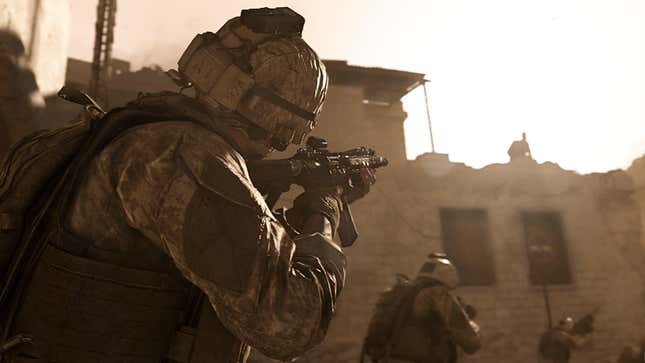
Stories about more immediate wars are harder to mythologize, and Call of Duty games, with less of an accepted popular canon to draw from, struggle to present a compelling argument in favor of the forever war we’re now in. This is why we must Respect The Troops: If no one can justify all the warmongering, the next best play is to attach it to a grand tradition of noble struggles, and manipulate our cultural respect for the men who fight them.
Modern Warfare looks at an ugly world, where battles are messy affairs in a vague campaign against “terrorism,” and tells a story about the people caught in them. Kyle Garrick is a London police sergeant inspired to fight after surviving a terrorist attack. Farah and Hadir Karim are sibling freedom fighters radicalized by the Russian occupation of their homeland, the fictional nation of Urzikstan. Alex is a CIA operative who, while working alongside the Karim siblings, begins to contemplate coming out of the shadows to fight alongside those who fight their oppressors in the daylight.
These are all people caught in the schemes of people who will never see the realities of war the way they do. In this, Modern Warfare, the video game, understands one aspect about modern warfare, the practice: It is often done at the bidding of liars and cowards, advancing their interests from afar while people fight for their lives. In doing this, Modern Warfare’s campaign articulates its strongest argument: These people should be free to decide whatever they wish to neutralize the threats they see on the ground, to “take the gloves off” and operate without meddlesome government lackeys or accountability.
It mythologizes these men the only way it knows how: by depicting them as noble, with the wherewithal to make difficult decisions. To let one man die to save several, to take innocents hostage, to torture. It places them—and therefore you—in the middle of impossible situations that echo pop-cultural depictions of real-world events, and makes them heroes. The raid on a compound where a warlord is in hiding echoes Zero Dark Thirty; an assault on an embassy is similar to 13 Hours, Michael Bay’s take on Benghazi.
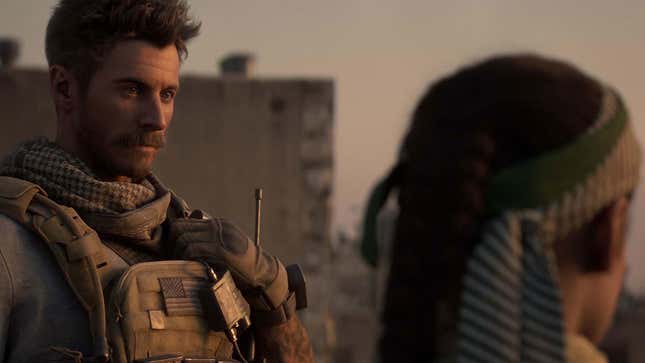
You could argue that Modern Warfare, to its detriment, is merely echoing the culture without spending much time reflecting on it. It is a synthesis of how we understand war today, one that plays it safe without really taking a stance of its own. Except it does take stances when it chooses how to depict that synthesis—namely, with Urzikstan, where Modern Warfare sets a mission called “Highway of Death.” It’s a name with a very specific connotation in the real world, referring to an event in the Gulf War where a United States-led coalition dropped bombs on the retreating Iraqi army.
In Modern Warfare, a similar event has taken place—only the perpetrators were Russians. Because while it’s true that its story depicts people on all sides as making tough, indefensible calls, as narrative director Taylor Kurosaki has said, at the end of the day, you’re always playing the hero.
In its campaign, Modern Warfare talks about the proxy war, the endless military machine that finds profit and opportunity in perpetual instability and bloodshed. Because of it, I have never really known a world without a war somewhere far away—where war belongs, I am told. I’m supposed to believe that this is how it is, and it’s no one’s fault. I know the truth though: War is good for business.
That’s fucked up, I thought as I booted up Modern Warfare’s multiplayer. When you launch the game, multiplayer is the central option, automatically highlighted. It’s the main attraction in any Call of Duty release—even if you play the 6- to 8-hour campaign, you’ll probably spend many, many more hours online.
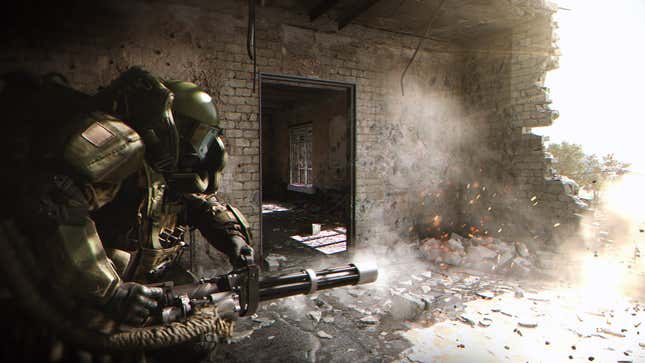
Multiplayer in Modern Warfare feels like it’s trying to adapt the campaign experience as best as it can, despite the rigid demands of Call of Duty fans, who revolt if a game strays too far from familiar terrain. Time will tell if the risks this version takes are too much. It’s only been a few weeks, but complaints about its intricate, dense map design surfaced almost immediately, their attempt to encourage more careful, complicated firefights chafing against the established rhythms of the playerbase.
I like it. I like the clear, narrow sightlines, the mid-map hotzones that can become impossible to penetrate, the nooks and crannies and elevated vantage points you don’t really expect. I play more slowly than I have other Call of Duty games, but when I play well, I perform. It’s satisfying.
All of it is satisfying. In America, guns have an allure that’s impossible to shake. We’re told we “won” the West with grit and some six-guns. Our action heroes are noble people who are better at shooting than evil people who are careless at shooting. In real life, and in Modern Warfare, I can adorn my firearms with charms, plate it with precious metals, give it a paint job.
In keeping with a recent trend in Call of Duty games, my player profile isn’t the only thing that levels up, giving me access to more weaponry, cosmetics, and perks. The guns I use level up, too. The more I use a weapon, the more I can personalize it, and tweak its performance to my liking. Eventually, I will have a better relationship with my guns than I do any character in this game. In fact, I think I already do.
I process all this even as I enjoy myself, swearing when someone gets the drop on me, laughing when I get revenge, feeling good when I grind out a new level. Why are things this way? Why do I like this so much? Maybe it’s because this is how it’s always been. Maybe because the proxy war’s wheels have turned so long that I have accepted it. This is just how video games are now.
There are two ways of thinking about a first-person shooter, and I slide between each of them while playing Modern Warfare.
The first is mechanical. I see the warzones as puzzles, a maze through which I must chart a path. Some areas are blocked off to me, because there’s an obstacle, a series of nodes that will result in failure if they notice me. If I delete it, the problem is solved, and I advance.
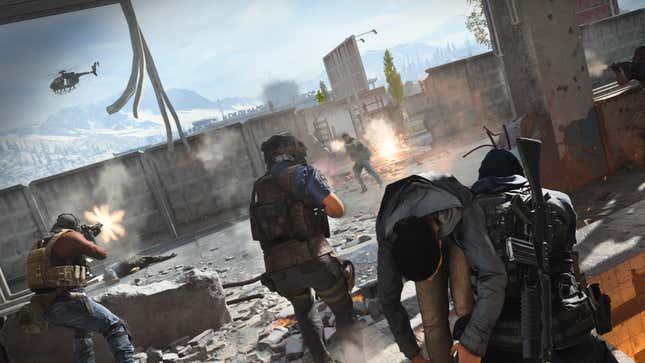
The other is diegetic. I see the war happening in front of me, and I process my actions as actions taken in that war. I fight the terrorists that have opened fire on civilians in Piccadilly Circus. I raid the compound where the warlord is hiding. I accidentally shoot the civilian woman because I thought she was going for a gun.
From the first point of view, Modern Warfare is a great video game, a thrilling series of pressure-cooker scenarios with plenty of variety and just enough challenge to remain engaging throughout. It’s highs aren’t as high as they are in other games bearing the Call of Duty name, but it doesn’t have a low point, either. It’s consistent, assured. The many developers involved in this game know what they’re doing.
From the latter, Modern Warfare is a clumsy, confused, and at times, repugnant work. It has me give a civilian instructions to escape a massacre via cell phone, pointing out safe spots with my right trigger button as I hop between security cameras to make sure she isn’t seen. It has me survive a waterboarding, and all I have to do is move the left thumbstick in the right direction to do so. It asks me if I want to sit in on the torture of innocents.
There’s little coherence in this story, outside of the argument that the good guys on the ground should be free to do whatever they think needs to be done once the bullets start flying.
“You draw the line wherever you need it,” Captain Price says at one point. “We get dirty, and the world stays clean.”
Only trouble is, that’s not the case. The world, as you can see in the game’s second mission from the burning wreckage and piles of dead civilians in London, is already plenty dirty. There’s no washing it out.
